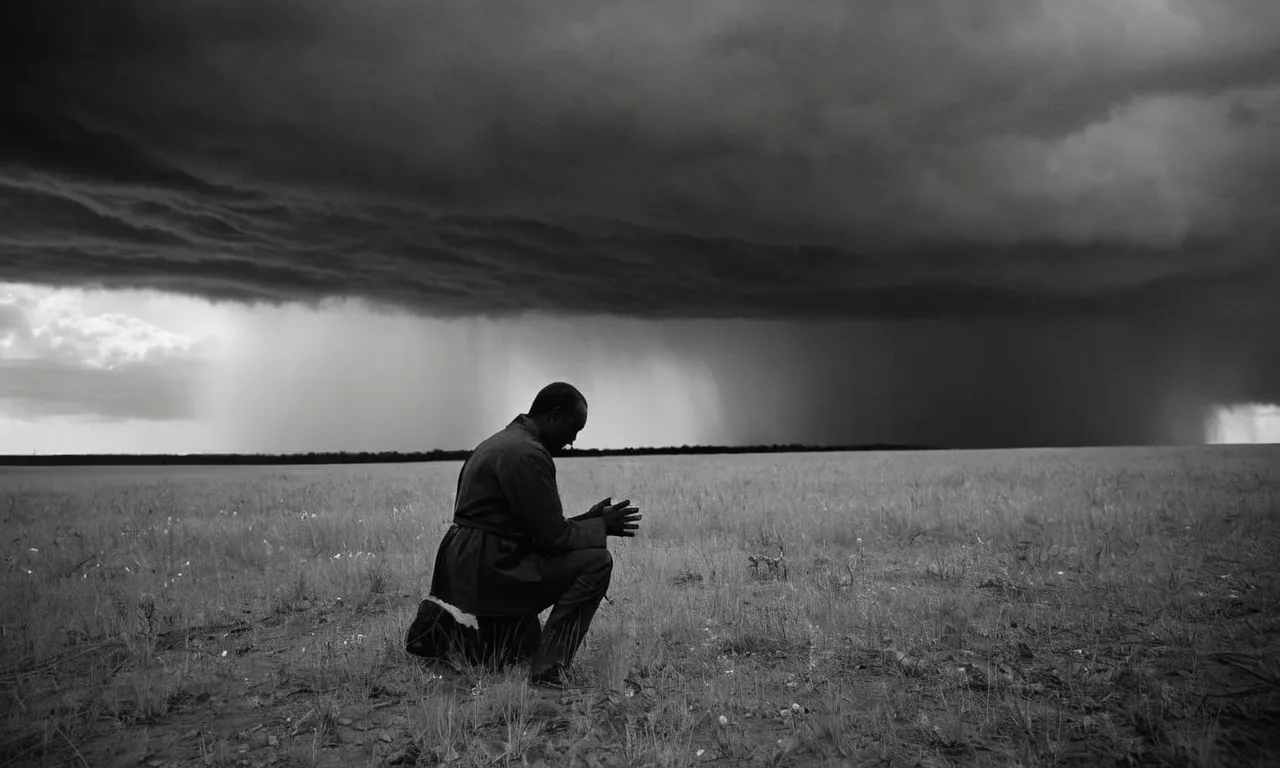When Does God Allow Killing?
The morality of taking a human life is one of the most controversial issues in religious ethics. With violence and war being an unfortunate reality of the human condition, faithful followers often wrestle with the question of when, if ever, it is acceptable to take the life of another.
If you’re short on time, here’s a quick answer to your question: Most faith traditions teach that killing is only morally justified in certain circumstances like self-defense or during a just war if there are no other options available.
In this comprehensive article, we will examine when the world’s major religions, including Christianity, Islam, and Judaism, allow for killing. We will look at key scriptures and theological principles that provide guidance around the ethics of killing.
Factors like self-defense, capital punishment, abortion, euthanasia, and just war theory will be explored from various religious perspectives.
Capital Punishment in Abrahamic Faiths
Christian Perspectives on the Death Penalty
Christianity has a range of perspectives on the morality and legality of capital punishment. Some denominations, like the Catholic Church, oppose the death penalty in all cases. Others believe it can be morally justified in certain circumstances. Here are some key points on Christian views:
- The Catholic Church has consistently called for the abolition of the death penalty since the late 20th century. Pope John Paul II appealed for clemency in capital cases and Pope Francis has condemned the death penalty as inadmissible.
- Mainline Protestant denominations, including Methodists, Episcopalians, and Presbyterians, officially oppose capital punishment and call for its abolition.
- Evangelical Christians are more divided. The Southern Baptist Convention supports the death penalty while other evangelical leaders like Rick Warren condemn it.
- Biblical passages like “an eye for an eye” (Exodus 21:24) and Romans 13:4 are used to argue for and against the death penalty.
- There are differences between individual Christians too. A 2021 Pew survey found 42% of US Christians favor the death penalty while 46% oppose it.
So while many prominent Christian voices reject the death penalty as incompatible with Christ’s teachings on mercy and redemption, others believe it can be morally justified in extreme cases like murder.
Jewish Perspectives on Capital Punishment
Judaism has a range of views on the death penalty. Here are some key Jewish perspectives:
- In principle, Jewish law permits capital punishment for certain severe crimes like murder. The Torah prescribes execution for premeditated murder (Exodus 21:12-14).
- However, Jewish law sets stringent evidentiary standards for applying the death penalty. For example, there must be two eyewitnesses to the crime.
- Over time, rabbinic authorities made it practically impossible to implement executions. This was seen as preferrable to mistakenly executing an innocent person.
- Reform and Reconstructionist Judaism oppose the death penalty entirely as a violation of human dignity.
- Orthodox Judaism theoretically allows capital punishment but opposes implementing it under modern conditions. Conservative Judaism also effectively opposes it in modern society.
So while the death penalty has a biblical basis in Judaism, rabbinic law and modern Jewish denominations largely oppose implementing it in practice.
Islamic Views on the Death Penalty
In Islam, perspectives on capital punishment derive from the Quran and Hadith as well as Muslim schools of jurisprudence. Key points include:
- The Quran permits the death penalty for murder and other offenses like spreading mischief in the land. “Take not life, which Allah hath made sacred, except by way of justice and law” (6:151).
- Hadith specify execution methods for murder (beheading) and adultery (stoning). But stringent evidentiary rules must be met.
- All mainstream Muslim schools of law accept capital punishment but differ on appropriate cases and methods. Some allow execution for apostasy.
- Modern Islamic scholars hold different views. Some argue the death penalty has a legitimate role in serious cases while others say it goes against the Quranic ethos of mercy and forgiveness.
- Most retentionist Muslim-majority countries allow the death penalty for murder, terrorism, rape, drug trafficking and sometimes apostasy, blasphemy and adultery.
Killing in Self-Defense
The use of lethal force in self-defense is a complex issue that religions have wrestled with throughout history. Here’s an overview of how some major faiths view this controversial topic:
Christianity and Self-Defense
Christianity generally discourages violence. Jesus preached nonviolence and loving one’s enemies. However, most Christian thinkers have accepted that killing may be justified in certain situations, such as self-defense or defending others.
The Catholic Church teaches that defending oneself or others with lethal force is permissible if certain conditions are met, such as the response being proportional to the threat and there being no non-violent alternatives. Many Protestants hold similar views.
Some pacifist Christian groups like the Quakers firmly reject all violence for any purpose. But most Christian churches and theologians permit force in self-defense as a last resort.
Judaism Allows Killing in Self-Defense
Jewish law, as expressed in the Torah and expounded in the Talmud, accepts that killing may be necessary to save a life. The law states that if someone breaks into your house, you can kill them in self-defense without being guilty of murder.
The principle of “pikuach nefesh” in Judaism says that saving a human life overrides nearly all other religious considerations. Therefore, killing in defense of yourself or others is not merely permitted, but is considered an obligation.
That said, Jewish law discourages unnecessary violence. The act of killing, even in self-defense, still taints the soul. But it is deemed a tragic necessity in order to save lives.
Islam Permits Killing to Protect Life
The Quran allows fighting in self-defense and protecting Islam, but discourages initiating hostilities. It says “Whoever kills a soul unless for a soul or for corruption in the land – it is as if he had slain mankind entirely.” (5:32)
However, most Muslim legal scholars have long accepted that killing is permissible in self-defense or defense of another. In Islam, human life is sacred, but taking a life to save another life is sometimes the only option.
That said, some believe nonviolence should be the first resort whenever possible in self-defense, and killing avoided if at all plausible.
Abortion and Euthanasia
Christian Views on Abortion and Euthanasia
Most Christian denominations believe that human life is sacred from conception to natural death. As a result, many Christians are opposed to abortion, considering it the taking of an innocent human life. Some Christian groups allow exceptions in cases where the mother’s life is in danger.
Christian opposition to euthanasia is also strong, as ending one’s life is seen as going against God’s authority over life and death. However, some Christians support passive euthanasia in terminally ill patients by withdrawing life support.
Jewish Perspectives on Abortion and Euthanasia
In Judaism, views on abortion vary, with most groups allowing it in cases where the mother’s physical or mental health is at risk. Orthodox Judaism only permits abortion to save the life of the mother, while Reform and Conservative Judaism leave the decision up to the individual.
Jewish thought emphasizes the importance of human life but also prioritizes the mother’s well-being. Regarding euthanasia, Judaism teaches that human life has immense value but does not require life prolongation at all costs.
Passive euthanasia by withdrawing treatment is often allowed in terminally ill patients, while active euthanasia is discouraged.
Islamic Positions on Abortion and Euthanasia
Islam strictly prohibits abortion after the ensoulment of the fetus at 120 days gestation, except to save the mother’s life. Before ensoulment, abortion may be permitted in certain circumstances like rape or fetal deformity.
Muslims are also generally opposed to euthanasia and physician-assisted death, as human life is valued and considered sacred. Withdrawing futile treatment in terminally ill patients is allowed, but actively ending a human life seen as interference with God’s plan.
Some contemporary Muslim thinkers argue that passive euthanasia can be permissible with strict regulations to prevent misuse.
Principles of Just War Theory
Christian Just War Principles
Christian just war principles originate from Biblical teachings and the writings of early Christian thinkers like Augustine and Thomas Aquinas. Some key principles include:
- War must only be waged by a legitimate authority like the state or ruler.
- War must be in response to a real and certain threat.
- War must be waged only with the right intentions – to restore peace and order, not for revenge or conquest.
- War must be a last resort after peaceful options have failed.
- The violence in war must be proportional to the injury suffered.
- There must be a reasonable chance of success in achieving the war’s goals.
- Innocent civilians should be protected from harm as much as possible.
These principles aim to ensure war is morally justified and conducted ethically. Most Christian churches today endorse some form of just war theory.
Jewish Laws of Wartime Conduct
Judaism’s laws of wartime conduct are derived from Biblical commandments and Rabbinic teachings. Some key principles include:
- Fighting a war of defense rather than conquest.
- Avoiding harming noncombatants – women, children, elderly, sick etc.
- Prohibiting wanton destruction of enemy property and resources.
- Allowing sieges but prohibiting starvation as a weapon.
- Requiring proper treatment of prisoners of war.
- Banning use of immoral weapons that cause excess injury.
These laws aim to balance military necessity with compassion even towards enemies. Jewish law permits fighting justified wars but within ethical boundaries.
Islamic Rules of Engagement in War
Islam’s rules of engagement originate from Quranic verses and the model set by Prophet Muhammad. Key principles include:
- War is only permitted in self-defense and to aid the oppressed.
- Noncombatants like women, children, clergy must not be harmed.
- Prisoners of war must be treated humanely and protected.
- Treaties and promises given to enemies must be fulfilled.
- Excess violence, torture, mutilation is forbidden.
- Muslim soldiers must fight with courage and never retreat or surrender.
These ethical guidelines in the conduct of war balance military necessity with Islamic virtues like mercy and justice even towards enemies.
Conclusion
Most major religions teach that human life is sacred. However, there are certain limited circumstances where taking a life may be ethically justified according to religious principles and scriptures.
While perspectives differ between faith traditions, most allow killing only as a last resort for self-preservation or defending the innocent. Other factors like capital punishment, abortion, euthanasia, and war also elicit careful theological considerations around the ethics of killing.








